

Storytelling. Consulting project. Ressources about Innovation & Creativity. Dialogue. If You Can’t Measure It, You’d Better Manage It. 28 May 2015 Wait, that’s not it.
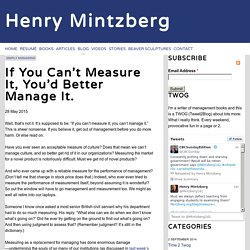
It’s supposed to be: “If you can’t measure it, you can’t manage it.” This is sheer nonsense. If you believe it, get out of management before you do more harm. Or else read on. Have you ever seen an acceptable measure of culture? And who ever came up with a reliable measure for the performance of management? Someone I know once asked a most senior British civil servant why his department had to do so much measuring. Measuring as a replacement for managing has done enormous damage—undermining the souls of so many of our institutions (as discussed in last week’s TWOG). Health care has likewise suffered from this cult of obsessive measuring, and not only at the hands of governments. Measuring as a complement to managing is a fine idea: measure what you can; take seriously what you can’t; and manage both thoughtfully.
Ethical practice and inquiry. Improv games. Tamarack Community Life - The Stone Game. Joe developed The Stone Game™ as a metaphor for what he calls meaning-based or creative communication.
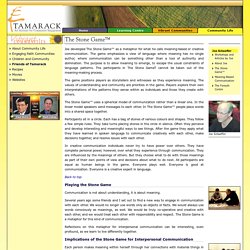
The game emphasizes a view of language where meaning has no single author, where communication can be something other than a tool of authority and domination. The purpose is to allow meaning to emerge, to escape the usual constraints of language patterns. The participants in The Stone GameT cannot be taken out of the meaning-making process. The game positions players as storytellers and witnesses as they experience meaning. The values of understanding and community are priorities in the game. The Stone Game™ uses a spherical model of communication rather than a linear one. Participants sit in a circle. In creative communication individuals never try to have power over others. Back to top. Communication is not about understanding, it is about meaning. Several years ago some friends and I set out to find a new way to engage in communication with each other.
The Experience of Resonance: How To Create Vibrant Conversations. Image: Chris Isherwood, Twang (2008) When we meet someone to learn about something, what is it that makes us deem the conversation successful and worthwhile?
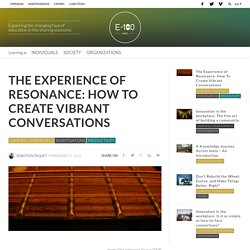
Having learned something is certainly part of the equation, but another aspect intuitively stands out: the feeling of connection, of there being a flow of current between ourselves and the other person. Call it resonance or vibrancy or flow, everyone has experienced this feeling. This article looks at what actually makes resonance happen. Last week I surveyed people online about their experiences, asking them to tell me with which people the resonance phenomenon happened to them. The Dawn of System Leadership. The deep changes necessary to accelerate progress against society's most intractable problems require a unique type of leader—the system leader, a person who catalyzes collective leadership.
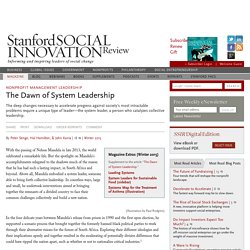
With the passing of Nelson Mandela in late 2013, the world celebrated a remarkable life. But the spotlight on Mandela's accomplishments relegated to the shadows much of the reason that he has had such a lasting impact, in South Africa and beyond. Above all, Mandela embodied a system leader, someone able to bring forth collective leadership. In countless ways, large and small, he undertook interventions aimed at bringing together the remnants of a divided country to face their common challenges collectively and build a new nation.
(Illustration by Paul Rodgers) At no time in history have we needed such system leaders more.
Harvesting. Individual learning and change. Training in structures that support humanity. In this video, Organizational practices applied by Tim Merry he talks about an organization that adopts basic practices to restore humanity to its structures.
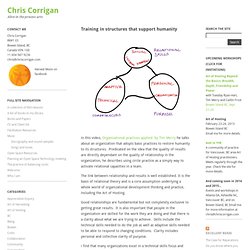
Predicated on the idea that the quality of results are directly dependant on the quality of relationship in the organization, he describes using circle practice as a simply way to activate relational capacities in a team. The link between relationship and results is well established. It is the basis of relational theory and is a core assumption underlying a whole world of organizational development thinking and practice, including the Art of Hosting. Good relationships are fundamental but not completely exclusive to getting great results. It is also important that people in the organization are skilled for the work they are doing and that there is a clarity about what we are trying to achieve. And what passes for good management is this technical axis of organizational life. BeyondHopeandFear.pdf. Exercices spirituels de saint Ignace de Loyola. Traduction du texte espagnolpar le Père Pierre Jennesseauxde la Compagnie de Jésus Numérisation de l'édition de 1913 par le Frère Jérôme novice de la même Compagnie Namur2005 Édition libre de tout droit Exercices spirituels 21 Pour se vaincre soi-même et régler sa vie sans se déterminer par aucune affection désordonnée.
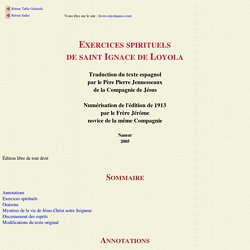
Supposition préalable 22 Afin que celui qui donne les exercices et celui qui les reçoit se prêtent un mutuel secours, et retirent un plus grand profit spirituel, il faut présupposer que tout homme vraiment chrétien doit être plus disposé à justifier une proposition obscure du prochain qu'à la condamner. Première semaine Principe et fondement 23 L'homme est créé pour louer, honorer et servir Dieu, notre Seigneur, et, par ce moyen, sauver son âme.